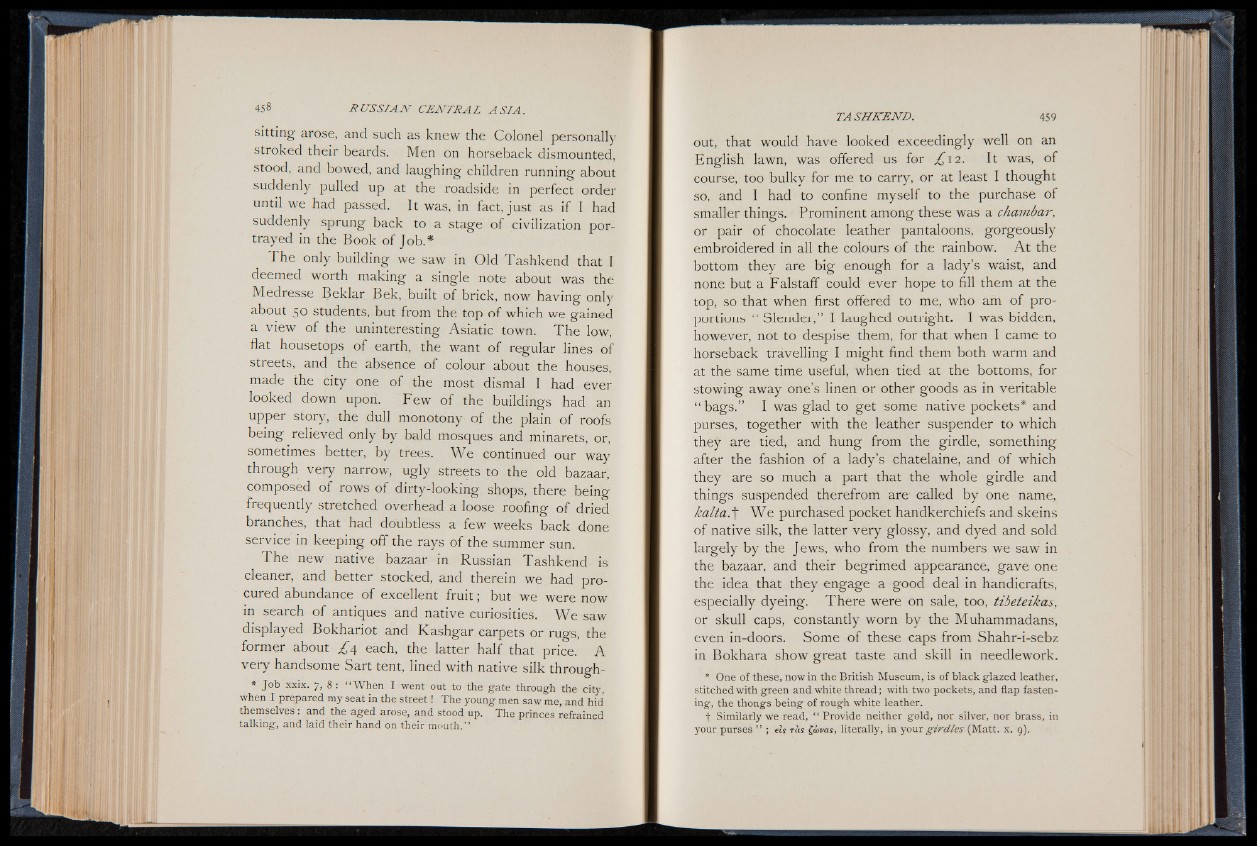
sitting arose, and such as knew the Colonel personally
stroked their beards. Men on horseback dismounted,
stood, and bowed, and laughing children running about
suddenly pulled up at the roadside in perfect order
until we had passed. It was, in fact, just as if I had
ddenly sprung back to a stage of civilization portrayed
in the Book of Job.*
The only building we saw in Old Tashkend that I
deemed worth making a single note about was the
Medresse Beklar Bek, built of brick, now having only
about 50 students, but from the top of which we gained
a view of the uninteresting Asiatic town. The low,
flat housetops of earth, the want of regular lines of
streets, and the absence of colour about the houses,
made the city one of the most dismal I had ever
looked down upon. Few of the buildings had an
upper story, the Bull monotony of the plain of roofs
being relieved only by bald mosques and minarets, or,
sometimes better, by trees. We continued our way
through very narrow, ugly streets to the old bazaar,
composed of rows of dirty-looking shops, there being
frequently stretched overhead a loose roofing of dried
branches, that had doubtless a few weeks back done
service in keeping off the rays of the summer sun.
The new native bazaar in Russian Tashkend is
cleaner, and better stocked, and therein we had procured
abundance of excellent fruit; but we were now
in search of antiques and native curiosities. We saw
displayed Bokhariot and Kashgar carpets or rugs, the
former about £ 4 each, the latter half that price. A
very handsome Sart tent, lined with native silk through-
* Job xxix. 7, 8 : “ When I went out to the gate through the city,
when I prepared my seat in the s tre e t! The young men saw me, and hid
themselves: and the aged arose, and stood up. The princes refrained
talking, and laid their hand on their mouth.’ ’
out, that would have looked exceedingly well on an
English lawn, was offered us for £12. It was, of
course, too bulky for me to carry, or at least I thought
so, and I had to confine myself to the purchase of
smaller things. Prominent among these was a chambar,
or pair of chocolate leather pantaloons, gorgeously
embroidered in all the colours of the rainbow. A t the
bottom they are big enough for a lady’s waist, and
none but a Falstaff could ever hope to fill them at the
top, so that when first offered to me, who am of proportions
“ Slender,” I laughed outright. I was bidden,
however, not to despise them, for that when I came to
horseback travelling I might find them both warm and
at the same time useful, when tied at the bottoms, for
stowing away one’s linen or other goods as in veritable
“ bags.” I was glad to get some native pockets* and
purses, together with the leather suspender to which
they are tied, and hung from the girdle, something
after the fashion of a lady’s chatelaine, and of which
they are so much a part that the whole girdle and
things suspended therefrom are called by one name,
kalta. f We purchased pocket handkerchiefs and skeins
of native silk, the latter very glossy, and dyed and sold
largely by the Jews, who from the numbers we saw in
the bazaar, and their begrimed appearance, gave one
the idea that they engage a good deal in handicrafts,
especially dyeing. There were on sale, too, tibeteikas,
or skull caps, constantly worn by the Muhammadans,
even in-doors. Some of these caps from Shahr-i-sebz
in Bokhara show great taste and skill in needlework.
* One of these, now in the British Museum, is of b lack g lazed leather,
stitched with green and white thread; with two pockets, and flap fastening,
the thongs being of rough white leather.
f Similarly we read, “ Provide neither gold, nor silver, nor brass, in
your purses ” ; els t « s (¿was, literally, in your girdles (Matt. x. 9).